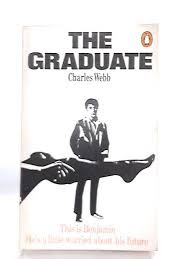
THE GRADUATE by Charles Webb


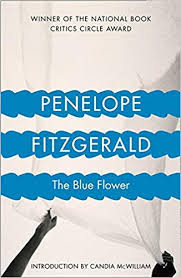
. . . the soups, one made of beer, sugar and eggs, one of rose-hips and onions, one of bread and cabbage water, one of cows’ udders flavoured with nutmeg.
It sounds like a hipster restaurant in Haringey. Or here is whats on offer at a fair they have been looking forward to – “Kesselfleish – the ears, snout and strips of fat from a pig’s neck boiled with peppermint schnapps.” One young lady has no one to take her to the fair, and is commiserated with:
A fine young woman still, what a pity she had no affianced to treat her to a pig’s nostril!
Or here is a mother and her daughter, talking about a guest’s room:
“And there is no chair in the room where he might put his clothes at night.” “His clothes! I have not undressed myself at night, even in summer, for I think twelve years.” “And yet you’ve given birth to eight of us!” cried Sidonie. “God in heaven spare me a marriage like yours!”
In the midst of all this domesticity is the protagonist’s (Fritz) idealistic young desire to be free of earthly things and to find a logic that unites all things. He is inspired at university by the philosopher Fichte:
Fichte was speaking of the philosophy of Kant, which, fortunately, he had been able to improve upon greatly. Kant believed in the external world. Even though it is only known to use through our senses and our own experience, still, it is there. This, Fichte was saying, was nothing but an old man’s weakness
He is a talker and a dreamer, who thinks he can see beyond the everyday reality of things. Here he is talking away to a busy young woman:
…all though he could live without love, he told her, he could not live without friendship. All was confessed, he talked perpetually. Neither the sewing nor the forewinter sausage-chopping deterred him.
So extreme an idealist is he that somehow when he falls in love with this twelve year old, who is not very pretty nor very bright, you somehow believe in his sincerity. It is gross, but to be fair he does not attempt to sleep with her and in any case most women were married at fourteen. It makes no odds, in any case, because she is dead of TB before she is fifteen, after some operations without anaesthetic that are almost as horrifying as the soups above. Fritz marries someone else, but is dead himself in under three years, also of TB; and so are almost all his siblings.
I mean, thank god for BCG. I have not done a good job of explaining this novel, but that is I think because I cannot. I need to re-read it to try and understand it.
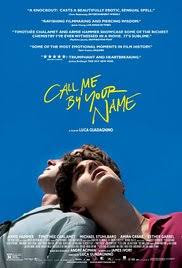
I decided I needed to re-read this wonderful book. Reading it this second time I am struck less by the immediate story – the painful first love – as by the background story: the many years there were to mourn that first love. I am surprised the first time I did not get that so clearly. Here Elio is, for example, at the war memorial where he first (sort of) told Oliver he was interested in him:
I wondered how many people here still remembered the young men they’d lost on the Piave River. You’d have to be at least eighty years old today to have known them. And at least one hundred, if not more, to have been older than they were then. At one hundred, surely you must learn to overcome loss and grief – or do they hound you till the bitter end? At one hundred, siblings forget, sons forget, loved ones forget, no one remembers everything, even the most devastated forget to remember. . . In thirty or forty years, I’ll come back here and think back on a conversation I knew I’d never forget, much as I might want to someday. I’d come here with my wife, my children, show them the sights, point to the bay, the local caffes, Le Danzig, the Grand Hotel. Then I’d stand here and ask the statue and the straw-backed chairs and shaky wooden tables to remind me of someone called Oliver.

What I found especially interesting was how explicit it was, for a book written in 1934. Try this, the opening paragraph:
OUR STORY opens in the mind of Luther L. (L for LeRoy) Fliegler, who is lying in his bed, not thinking of anything, but just aware of sounds, conscious of his own breathing, and sensitive to his own heartbeats. Lying beside him is his wife, lying on her right side and enjoying her sleep. She has earned her sleep, for it is Christmas morning, strictly speaking, and all the day before she has worked like a dog, cleaning the turkey and baking things, and, until a few hours ago, trimming the tree. The awful proximity of his heartbeats makes Luther Fliegler begin to want his wife a little, but Irma can say no when she is tired. It is too much trouble, she says when she is tired, and she won’t take any chances. Three children is enough; three children in ten years. So Luther Fliegler does not reach out for her. It is Christmas morning, and he will do her the favor of letting her enjoy her sleep; a favor which she will never know he did for her. And it is a favor, all right, because Irma likes Christmas too, and on this one morning she might not mind the trouble, might be willing to take a chance. Luther Fliegler more actively stifled the little temptation and thought the hell with it, and then turned and put his hands around his wife’s waist and caressed the little rubber tire of flesh across her diaphragm. She began to stir and then she opened her eyes and said: “My God, Lute, what are you doing?” “Merry Christmas,” he said.
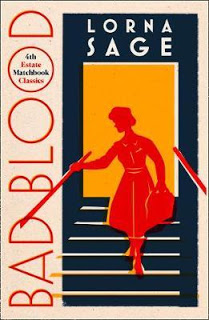
Grandfather’s skirts would flap in the wind along the churchyard path and I would hang on. He often found things to do in the vestry, excuses for getting out of the vicarage (kicking the swollen door, cursing) and so long as he took me he couldn’t get up to much. I was a sort of hobble, he was my minder and I was his. He’d have liked to get further away, but petrol was rationed. The church was at least safe. My grandmother never went near it – except feet first in her coffin, but that was years later, when she was buried in the same grave with him.Rotting together for eternity, one flesh at the last after a lifetime’s mutual loathing. In life, though, she never invaded his patch; once inside the churchyard gate he was on his own ground, in his element. He was good at funerals, being gaunt and lined, marked with mortality. He had a scar down his hollow cheek, too, which Grandma had done with the carving knife one of the many times when he came home pissed and incapable.
He and Nurse Burgess, now MB for short in the diary, pedal to paradise every day of the week, including Sunday. Trailing a cloud of midges, they’d hump their bikes off the road, through some muddy gateway and, behind the hedge, hug and knead each other among the mallows and Queen Anne’s lace and nettles dusty with pollen.
This is another aspect of rural life that’s lost now that the middle-class diaspora has populated the countryside with property-owning vagrants: the peculiar hell of having to live with such substantial ghosts from your past.
Farming life seemed a perpetual-motion machine, or an effect of gravity, something cyclic and unstoppable. Actually, it was because this kind of small-scale tenant farming was vanishing that the impression was so strong. Ways of life have been dying out in rural England time out of mind, at least for two hundred and fifty years since the great wave of eighteenth century enclosures. It’s the sense of an ending that’s timeless. The best symbol of this version of pastoral is a rusting and discarded piece of farm machinery in the corner of a field.
The grandparents weren’t grateful. They both felt so cheated by life, they have their histories of grievances so well worked out, that they were owed service, handouts, anything that was going . . . . Did they love me? The question is beside the point, somehow. Certainly they each spoiled me, mainly by giving me the false impression that I was entitled to attention nearly all the time. They played. Theywere like children, if you consider one of the things about being a child is that you are a parasite of sorts and have to brazen it out self-righteously.
My parents’ plan was that I should go to a Church Home for Unmarried Mothers, where you repented on your knees (scrubbed floors, said prayers), had your baby (which was promptly adopted by proper married people) and returned home humble and hollow eyed. Everyone would magnanimously pretend that nothing had happened, so long as you never seemed to be having a good time or developing too high an opinion of yourself – from now on you could count yourself lucky if they let you learn shorthand and typing. . . My father was appalled and also triumphant. Just as in the old days he’d done his best to beat vicarage corruption out of me, now he righteously denounced me for my scandalous offence against decency, monogamy, and my mother. He galloped off on his high horse, chivalrously saving her once again from the horrible past. . . .
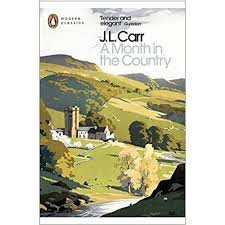
I am in what I assume is the minority of readers who come to this classic by way of the Gambia. I always like to read a book set in the country I’m visiting, and so I read JL Carr’s A SEASON IN SINJI when on holiday there. I enjoyed it, so thought I would read this one, which is by far his more famous work.
It shares a lot of similarities with SINJI, involving war veterans, reflections on niche aspects of English culture, and a ragingly homosexual undertone throughout. Just like the other one, it is about two men who find they have a lot in common but somehow are mysteriously separated by the end which is apparently tragic despite them being so extremely straight.
That’s pretty much it: two guys become friends over the course of a month and then it ends.
I did enjoy the way in which they met – as veterans they recognized each other. One has a facial tic, and almost as soon as they meet the other says:
“Oh come on,” he said. “I don’t need to be told you didn’t catch that twitch on the Great Eastern Railway, so we may as well start straight away swapping stories about the same bloody awful place.”
I would be interested to know the extent to which that really is the experience of verterans; that they find each other easy to spot. Much of the book is about church restoration, which is more interesting than it sounds. I also therefore enjoyed learning about religious architecture; here for example is an offhand comment about a church:
It was an off-the-peg job: evidently there had been no medieval wool boom in these parts. This had been starveling country, every stone an extortion.
How interesting! Who knew there was a medieval wool boom and that you could see it in churches.
Overall, though, I’m not sure why this is such a classic. I found it a bit plotless and a little dull.
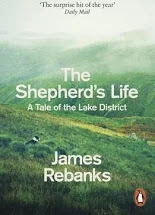
I have never read a book so dripping with privilege. I read it weeks ago and it still makes me feel cross every time I think about it.
It started off on a bad note, in the Introduction, where he tells us:
If we want to understand the people in the foothills of Afghanistan, we may need to try and understand the people in the foothills of England first
That ‘we’ made me mad – the implicit assumption that everyone reading this book has the same frame of reference and must be British.
And mentioning Afghanistan is a particularly bad move. The book is about his life as a shepherd in the Lake District. He struggles to make ends meet, because sheep farming in that context is fundamentally not economically feasible. Whereas other people when they are in situations where their preferred life is now longer economically feasible (e.g., in Afghanistan because of conflict, or in Chad because the Lake is disappearing due to climate change) then those people just have to SUCK IT UP and do something else. In his case, however, the Lake District has been heavily funded by the Government and by independent philanthropists who have chosen to fund non-urgent needs, he is able to carry on with his preferred lifestyle. And not only does he get to carry on, but he feels free to moan about it too. For example, he appears to disdain tourists Here he is on his grandfather, who he typically agree with:
I don’t think he understood that those people had another perception of ownership of the Lake District. He would have found that as odd as him walking into a suburban garden in London and claiming it was sort of his because he liked the flowers
Tourists don’t claim to own the Lake District because they like the flowers but because IT IS THEIR TAX DOLLARS THAT ALLOW IT TO EXIST. Even worse, here he is on such unimportant matters as the environment:
I can remember officials from ‘the Ministry’ (of Agriculture) coming to talk to him about the ‘biodiversity’ in our hay meadows and what they expected him to do to manage those meadows for the flowers and birds in return for the subsidy they paid. After an hour and a half of observing him nodding and agreeing to everything they suggested, they departed, and I asked him what they wanted. He said, ‘No idea . . . The secret with them daft buggers is to say yes to everything they want, and when they’ve gone carry on regardless’
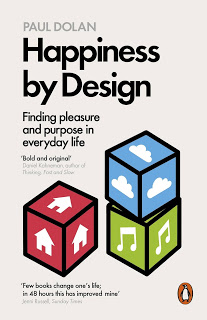
I decided that in 2019 I would for the first time in my life start reading self-help. Let’s not go into why, as this is allegedly not a confessional blog. Now this is not my first self-help book of the year, but I can’t immediately find the the other one, so here we go.
Stammering less has helped, of course, but paying less attention to it matters much more. What applies to my stammer applies to all the possible causes of your happiness and to all that you might do to be happier. Your happiness is determined by how you allocate your attention. What you attend to drives your behaviour and it determines your happiness. Attention is the glue that holds your life together. . . The scarcity of attentional resources means that you must consider how you can make and facilitate better decisions about what to pay attention to and in what ways. If you are not as happy as you could be, then you must be misallocating our attention.
You can trust your own experiences more than your desires. You might think that being the next Lady Gaga will make you happy and attempt to achieve it but then find that all your experiences along the way are miserable ones. It’s uncertain what your experiences of fame would be like if you were to attain it and so if you aren’t experiencing pleasure and purpose along the way, you are giving up happiness now that might not lead to more happiness later. Keep your eye on the happiness prize by tuning into the feedback from your experiences. You can also trust your own experiences more than your projections. Whatever you choose to do, you will only ever experience your choices, not the other options involved in the decisions, and so you won’t spend anywhere near as much time thinking about what might have been as you think you will.
I followed his advice about keeping a diary for a couple of days that just lists your activities on those days and score from 1-10 how pleasant or purposeful they were (i.e., how happy they made you). It was indeed quite illuminating. I have also found this focus on attention to be quite helpful for example when in a queue; the idea that I can choose whether or not to focus on the irritating queue (rather than my podcast for example) is quite liberating. In general though, he argues:
We don’t really allocation unconscious attention in any meaningful way – it just gets allocated without us having to make any real decision about what is attended to. But, as we shall see, you can consciously select the environments that your unconscious attention can roam in. Although you can’t consciously dictate how your dug runs around a field, you can choose which park you take it to. We are a lot like dogs in how we react to situational triggers.
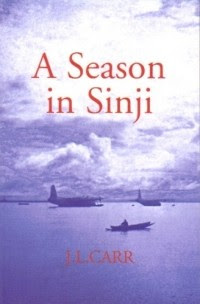
The others turned their back and pulled blankets over their heads as we’d done so many times before. No-one wanted to know us now we were for the mincing machine.
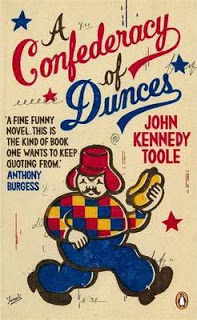
The key character is Ignatius J Reilly, and given that the plot is patchy at best it is this character that is the whole joy and energy of the book. Ignatius is an unemployed obese man who lives with his mother. He is however not idle. As he puts it:
“I am at the moment writing a lengthy indictment against our century. When my brain begins to reel from my literary labors, I make an occasional cheese dip.”